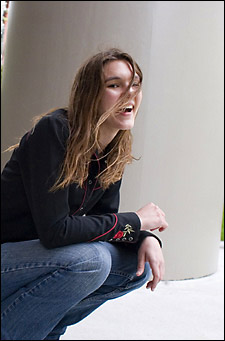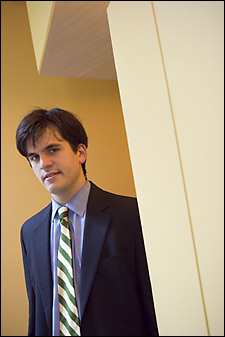Speaking in tongues, modern and ancient
Orators will bring down the house, well, the tents

Joy Seth Hurd IV speaks fluent Latin. Martin Spencer Bell has his sights set on being a trial lawyer. Liz Carlisle is a country singer/songwriter with an album on record store shelves. Though these graduating Harvard students may seem very different, they all have something in common: On Commencement Day, each will take the stage of Tercentenary Theatre and deliver the speech of a lifetime to an international audience of more than 30,000.
Far from considering this a nightmare scenario, Hurd, Bell, and Carlisle are revved up and raring to go as this year’s student orators. To get here, the three won the University’s Commencement Orations Competition, an American Idol-like contest in which all graduating students are invited to compete in a grueling speech-writing challenge. The contestants battle it out to earn a spot in Harvard’s long Commencement Day history and a place on stage to deliver what some call the highlight of Commencement Morning Exercises.
“The orations have a special place in the Morning Exercises, partly because they are the only speeches delivered during that ceremony,” says Richard J. Tarrant, Pope Professor of the Latin Language and Literature and chair of the Committee on Commencement Parts, the selection committee for the orations. “These student orators are responsible for setting the tone for the occasion and for reflecting on their Harvard experiences in ways that will give meaning to Commencement for both the graduates and their families and friends.”
The search for the orators begins in April and usually involves three rounds of competition. The first round is an open invitation to graduating students to submit in writing several copies of a five-minute speech about their experience at Harvard. A six-member panel of professors, deans, and other Harvard officials selects the best speeches, and invites those candidates to participate in round two. In this stage, candidates deliver their speech to a live audience. The winners compete in the third and final live audition. Judges are looking for one student from the graduate or professional level and two undergraduates – one of whom will speak in Latin – to address the degree candidates, family members, alumni, faculty, and guests who will be in attendance at Harvard’s 355th Commencement on June 8.

“In considering submissions,” explains Tarrant, “the selection committee looks for speeches that convey a message of wide appeal and relevance, and that do so with a freshness that makes the message come alive.”
Indeed, entertaining and inspiring so many people is no easy task, but each year the young orators rise to the occasion.
“I’m a country singer and songwriter from Montana, and I majored in folklore and mythology at Harvard,” says Carlisle. Having released her first album, “Five Star Day,” in August 2005 and performed her music across the country, she is no stranger to the spotlight. “This is a wonderful opportunity for me because I love performing and I’m comfortable in front of an audience.”
She has been working with a voice coach in preparation for her speech, the theme of which stems from her childhood. “My speech is called ‘Expedition Harvard’ and it draws on my Montana roots. My dad used to read me ‘The Journals of Lewis and Clark.’ These were powerful stories. … Though they were well trained, [Lewis and Clark] were placed in a new situation in unfamiliar territory. They had to be observant, revise their ideas, and learn from others.”
The explorer in Carlisle couldn’t help but compare her adventures over the past four years at Harvard to the famous trailblazers’ experiences.
“All Harvard students were successful in high school, but when we came here we had to reinvent ourselves. We were in unexpected territory and we had to learn from those around us in order to succeed again,” she explains. “As we leave, we take with us a new series of skills. I want people to approach the next phase of their lives with the same spirit of exploration, open-mindedness, and observation. I want people to approach their next new frontier with confidence and vigor no matter where they’re going or whether they even know in what direction they’re headed. We will all be carried forward and we will all pursue our dreams as long as we maintain our willingness to learn and our pioneering spirit.”
Hurd will be giving a speech inspired by events that took place long before those that touched Carlisle. “My speech will compare Harvard to Ancient Rome,” explains Hurd, a Classics concentrator who will give the Latin oration. “There are lots of comparisons to be made. Harvard, like Rome, has this aura of majesty and greatness. Harvard and Rome have many great academic figures; we have Annenberg Hall, which I relate to the Pantheon; and I compare Harvard Yard to the Forum.”
Though he racked his brain for months to come up with a winning theme for the speech competition, Hurd was able to translate his words into Latin fairly easily. “It’s kind of ironic that I’m giving the Latin oration because my mom made me study it against my will as a child,” he laughs. “When I got to Harvard, I continued to study the language and really enjoyed it. I even spent a summer in Rome studying with the world’s best Latinist!”
His speech will have what Hurd calls the “requisite Yale joke,” and will urge graduates “to respect the knowledge and experiences they’ve gained at Harvard, to recognize Harvard’s role in the world, and to appreciate that with great power comes great responsibility,” he says. “My speech will have entertainment value and will be funny, but the ultimate message is that we are Harvard men and women forever. We have to be responsible and act for the betterment of the world. We have to keep accelerating our ambition and continue to work hard.”
Bell – who completed his undergraduate degree at Harvard and on June 8 graduates from Harvard Law School – attempts to address those graduates who haven’t yet saved the world. “People accomplish so much at Harvard, and graduation involves a period of self-examination,” he reflects. “We think of all we haven’t done, but my response to that reflection is that we have to be excited and optimistic. Commencement is traditionally a celebration of our accomplishments, but it’s more invigorating to think of it as a celebration of our potential. We will emerge from Harvard and accomplish a great deal of good in our respective fields. It’s emboldening to have earned a degree from Harvard, but our time to accomplish more good starts now. It’s a beautiful and exciting thing.”
With their concepts clear and their speeches written, the orators spend lots of time refining their delivery. “They receive advice on every aspect of their speeches, from content and wording to delivery, pace, and gesture,” says Tarrant. “Once the stage has been constructed in Tercentenary Theatre, they have several chances to deliver their speeches on the spot, to adjust to the microphone and sound system, and to practice bowing to the president before and after their speech. When Commencement Day arrives, they are ready to give their finest performance.”
Despite all the preparation, even these high achievers can get a bit nervous as the day approaches. “I have such respect for this tradition and can’t help but be a little in awe of the ritual,” admits Carlisle.
Hurd concurs: “It’s very exciting, but it’s getting a little more nerve-wracking as the day gets closer. I mean, the Latin oration is one of Harvard’s oldest traditions. I’m honored to be part of maintaining it.”
Bell is handling his jitters by relying on his extensive support network. “Few things frighten you more than speaking before thousands of people,” Bell says, “but I’m relieved by the fact that I’ll be among my Harvard undergraduate and Law School friends. I know they’re rooting for me, and it’s reassuring.”
After graduation, life goes on. Carlisle will continue to tour, performing in England, Scotland, and locations across the United States. She also plans to start recording her next album, but will return to Harvard in the fall to work with student musicians and serve as a House masters’ assistant at Quincy House. Bell will begin working at a New York law firm, while Hurd hopes to stay a little closer to Harvard. He’d like to work in higher education before pursuing another degree.
In the meantime, though, their main focus is Commencement Day. “Being an orator is incredible and wonderful,” says Carlisle. “It’s such a powerful ritual, and a real rite of passage. I can’t wait!”




